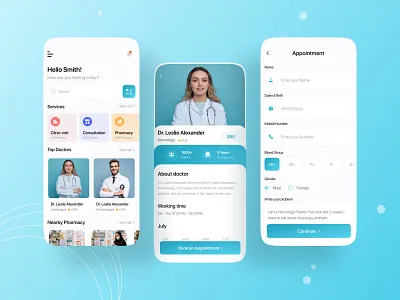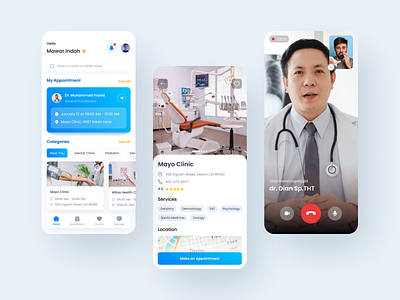How a Mobile App for Clinics Boosts Communication Between Doctors and Patients
How a Mobile App for Clinics Boosts Communication Between Doctors and Patients
Blog Article
The Future of Medical Care: Why Clinics Required a Mobile Application Today
As the medical care landscape continues to advance, clinics face placing pressure to adapt to person expectations for greater benefit and accessibility. The combination of mobile applications can serve as an essential strategy for improving person interaction and improving operations.
Changing Person Assumptions
As the landscape of medical care progresses, individual assumptions are undergoing a substantial improvement. Today's individuals are progressively seeking convenience, access, and personalized treatment.
Moreover, people are coming to be much more educated and equipped, usually looking into problems and therapies online prior to consultations. This enhanced awareness is combined with a demand for openness in healthcare procedures, including cost estimates and therapy alternatives. Therefore, carriers are compelled to adapt by taking on electronic tools that improve the client experience.
The expectation for reliable and prompt interaction has never ever been higher, with many people thinking about responsiveness a critical component of quality treatment. mobile app for clinics. In this developing landscape, medical care organizations have to acknowledge these altering assumptions and utilize mobile applications to promote a much more patient-centric technique, making sure that they not only meet but go beyond the criteria set by today's informed consumers
Enhancing Client Engagement

Mobile applications help with interaction between people and healthcare providers, making it possible for real-time visit organizing, suggestions for drug adherence, and straight messaging features. These functionalities not just improve ease however also construct a sense of responsibility amongst patients. Moreover, mobile apps can supply educational material tailored to individual requirements, assisting individuals much better recognize their problems and therapy choices.
The integration of gamification components within healthcare apps can likewise encourage clients to involve in healthy actions, reinforcing favorable way of life modifications. Inevitably, boosting client involvement through mobile applications leads to enhanced health end results, better client complete satisfaction, and a more joint medical care experience.
Enhancing Center Operations
Simplifying center procedures is important for boosting process efficiency and maximizing person treatment. The execution of mobile applications can substantially lower management problems, enabling medical care companies to concentrate more on person communications. By automating appointment scheduling, person check-ins, and billing procedures, centers can minimize wait times and boost general operational performance.
Mobile apps also facilitate real-time access to individual records, making it possible for healthcare professionals to make informed decisions quickly. This immediacy not just boosts the top quality of treatment but additionally lowers the likelihood of errors related to misplaced or dated information. Leveraging mobile modern technology sustains a more orderly right here approach to taking care of client follow-ups and therapy strategies, guaranteeing that no critical actions are overlooked.
Additionally, mobile apps can streamline inventory administration by supplying clinics with tools to keep an eye on products and medications efficiently. This permits prompt replenishment and aids stay clear of disruptions in person care as a result of stock shortages. By integrating these capabilities into their daily operations, clinics can develop a much more cohesive and effective environment, inevitably resulting in boosted individual results and complete satisfaction. Embracing mobile technology is not simply a pattern; it is a needed advancement in the health care landscape.
Improving Interaction Channels
Efficient communication is frequently mentioned as a keystone of top quality health care distribution. In today's fast-paced clinical atmosphere, mobile applications can considerably boost interaction networks in between centers, people, and doctor. By integrating mobile applications into their procedures, clinics can promote real-time communications, making sure that patients obtain prompt information concerning their visits, examination outcomes, and treatment plans.
Mobile apps also empower people to connect directly with their medical care groups via safe and secure messaging functions. This straight line of interaction cultivates a feeling of engagement and enables immediate information of concerns, which can lead to much better adherence to treatment protocols. Furthermore, press alerts can advise patients of upcoming visits or drug schedules, reducing no-show rates and improving general wellness end results.

Staying Competitive in Healthcare
In a rapidly advancing healthcare landscape, companies must focus on advancement and flexibility to keep an affordable edge. The assimilation of mobile applications right into healthcare services is no longer optional; it is essential for centers intending to improve patient engagement, enhance her response operations, and enhance general solution shipment.
As people increasingly count on electronic systems for health monitoring, facilities that stop working to take on mobile innovation danger falling back. A well-designed mobile app can supply functions such as appointment scheduling, telemedicine consultations, and access to medical records, offering clients with comfort and cultivating commitment.

Competitors are likewise buying mobile solutions, so remaining ahead calls for continuous enhancement and staying notified regarding technological developments. Centers must not only carry out mobile applications yet additionally take part in routine updates and refinements. Eventually, the effective assimilation of mobile innovation will identify forward-thinking health care companies and established the benchmark for patient-centric treatment in a digital globe.
Verdict
To conclude, the combination of mobile applications in centers is critical to attend to the developing landscape of person expectations. By improving person engagement, enhancing procedures, and improving communication networks, centers can considerably increase health results. Additionally, the fostering of mobile modern technology placements facilities to remain competitive in a progressively electronic health care environment. Eventually, the calculated implementation of mobile apps represents a vital step towards supplying individualized and accessible medical care, thereby meeting the demands of today's equipped individuals.
Eventually, boosting patient involvement through mobile applications leads to enhanced wellness end results, higher client satisfaction, and a much more collaborative health care experience.Mobile applications additionally promote real-time accessibility to individual records, enabling health care specialists to make educated choices swiftly. In today's busy clinical atmosphere, mobile applications can considerably boost interaction networks in between clinics, individuals, and healthcare companies.Mobile applications also empower patients to interact directly with their medical care groups through safe messaging features. Eventually, the strategic execution of mobile apps represents a crucial step toward supplying easily accessible and individualized medical care, consequently meeting the demands of today's encouraged patients.
Report this page